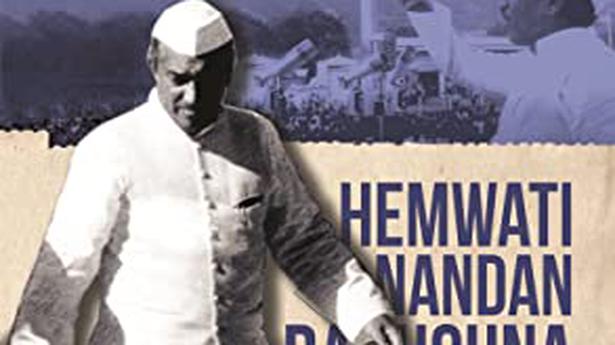
Review of Hemwati Nandan Bahuguna — A Political Crusader: A handbook on UP’s turbulent political history
The Hindu
The life of H.N. Bahuguna is an important contribution towards understanding the rifts within the Congress, in Delhi as well as in the States
The starting point of the biography, Hemwati Nandan Bahuguna: A Political Crusader, is a fascinating account of how Bandopadhyas from Gaur province of United Bengal Province transformed into ‘Bahugunas’ (of many qualities) of the Garhwal region.
Co-authored by Ram Naresh Tripathi and Rita Bahuguna Joshi, daughter of the freedom fighter and former Congress stalwart, and translated into English by Ajai K. Rai, the book is helpful in understanding contemporary politics of Uttar Pradesh, the power play and the subsequent decline of the Congress and so forth.
Chronicling Bahuguna’s transformation from being an impressionable mind, inspired by Mahatma Gandhi and Jawaharlal Nehru, to emerging as a student leader who was on the radar of the British authorities during the Quit India movement, the book also sheds light on the role of student leaders of Allahabad University, then the citadel of the students’ movement.
“By the last week of August, the movement [protests following the Quit India call] had split into two streams — the violent and the non-violent. Bahuguna dexterously handled both streams of the movement. He used to infuse his foot soldiers with so much vigour and confidence that they put their lives at risk to complete the assigned work. Blessed with a photographic memory, Bahuguna addressed his cohorts by the names of their native place or mohalla. His exceptional memory had a magical effect on the activists, and each one of them felt that he was closest to Bahuguna,” the book quotes Prof. Damodar Khanna, a colleague of Bahuguna’s, to reveal the transformation of the young boy from Garhwal into a promising student leader.
The book also sheds light on how students seamlessly moved between the parallel political narratives of moderate nationalists and armed revolutionaries; how many like Bahuguna were as much influenced by Lenin as they were by Gandhi and Nehru.
Stepping out of student politics, Bahuguna created a niche for himself as a trade union leader. He first contested and became an MLA in 1952 from the Karchana Assembly seat and eventually became a minister in U.P. in 1957.
Until 1969, he was a towering figure in U.P. politics and eventually joined Indira Gandhi’s council of ministers as a Minister of State for Communication in 1971. The rank as well as the portfolio was seen as a demotion by Bahuguna’s supporters but he accepted it without any fuss and gave his own spin with the slogan, “I am the country’s first postman.”











